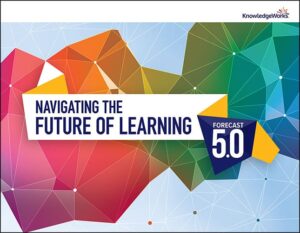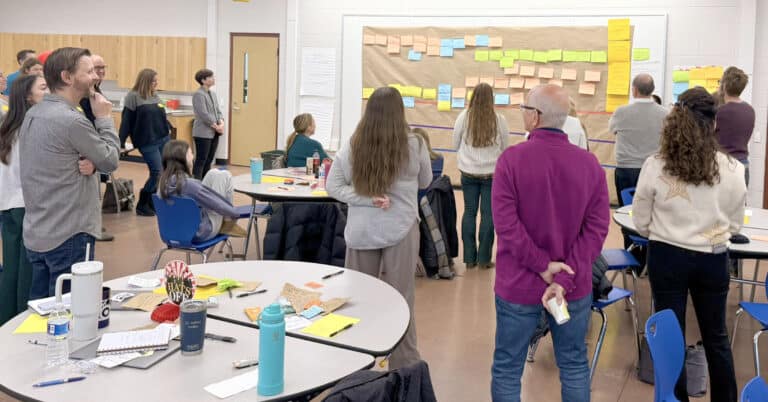Given the rapid changes that are reshaping many facets of our lives and opening new possibilities and challenges for education, I see implications of KnowledgeWorks’ latest ten-year forecast, Navigating the Future of Learning, as clustering in four key areas: success; engagement; technology use; and learner and educator capacity.

Navigating the Future of Learning
In our fifth forecast, you will discover how current trends could impact learning ten years from now and consider ways to shape a future where all students can thrive
Success
As those of use focused on strategic foresight at KnowledgeWorks have been exploring for some time now, our current definitions and measures of success are straining to reflect the full range of what learners know and able to do and what we already know is important for human development, much less what they might need to be successful in the future. Our definitions and measures of success also prioritize dominant narratives that may not fully reflect individuals’ and communities’ aspirations and understandings of what it means to live a fulfilling life or to contribute productively to society. To address these issues as the landscape external to education continues to change, schools, districts and other K-12 stakeholders can work to:
- Expand conceptions of learning and well-being as they relate to educational success
- Align outcomes and operations to support broader narratives and measures of success
- Broaden assessments to reflect a wider range of human development.
Engagement
New tools and processes for cultivating engagement, along with heightened expectations for having a say in what happens in society and organizations, are changing how governance works and what people expect from it. At the same time, expanding notions and recognition of where, when and how learning happens are continuing to push the boundaries of traditional schools and educator roles. To respond to these shifts, schools, districts and other K-12 stakeholders can consider how they might:
- Bring more student, teacher and family voice and agency – and more forms of engagement – into school governance and decision making
- Cultivate civic engagement and community contribution
- Treat the community as a learning landscape to enhance and extend opportunities for learning
- Develop new educator roles that help achieve new aims.
Technology use
As artificial intelligence and machine learning become more powerful and make their way further into education, stakeholders will need to attend to questions related to trust, bias and individual agency. In addition, increasing insights into cognitive function, along with more and more tools and practices designed to translate those insights into individual supports and interventions, will raise questions about how much agency learners and their families have. To help address these important issues, schools, districts and other K-12 stakeholders can:
- Consider how to make effective use of artificial intelligence and other developing tools without sacrificing student and educator agency or causing further inequity
- Consider how to incorporate new neuroscience-informed tools, insights and practices to support learning while also respecting learners’ rights in deciding when and how to use them
- Implement safeguards to ensure that data strategies and the use of emerging technologies support learners in ways that align with the school’s or district’s culture and aims.
Learner and educator capacity
Even as an expanded array of technological tools raises questions related to equity and agency, these same tools could have the potential to extend learners’ and educators’ capacity in and beyond learning environments. Finding appropriate uses of new tools that align with desired learning cultures and practices will be essential. So will supporting all learners in being wise consumers of these tools – and in going beyond that to help steer their use and development. To support these aims, schools, districts and other K-12 stakeholders have the opportunity to:
- Support learners in understanding and navigating their rights and responsibilities in interacting with an expanded range of digital technologies
- Help learners collaborate with smart machine partners while encouraging them to be creators
- Provide educators with digital partners or other smart tools – and appropriate training and support — that enable them to focus more on student relationships.
Starting with implications
Recently I had an opportunity to chat with the Board of Governors of the International School of Luxembourg about these implications as they pertain to their learning community. Focusing the conversation on these implications, given that the board members had read the forecast, enabled them to go deeper in a short time than is often possible when KnowledgeWorks’ strategic foresight team focuses our presentations on raising awareness of forecast’s core content. We were able to focus most of our time together on exchanging ideas and exploring some of the big opportunities and challenges on the horizon.
For guidance on engaging with Navigating the Future of Learning in your context, see our discussion guides for:
- District, school and classroom leaders
- Higher education administrators, faculty and staff
- Education thought leaders and changemakers.
A recorded webinar highlighting core content from the forecast is also available.







